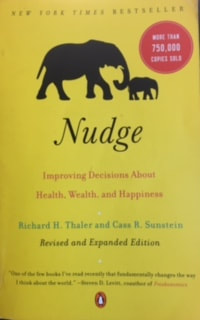 This is essentially a review of a fascinatingly engaging book by Professor Richard Thaler (University of Chicago), 2017 Nobel prize in Economics and Professor Cass Sunstein (Harvard University). It is entitled Nudge: Improving Decisions About Heath, Wealth, and Happiness. The major premise of the book is that most human beings do not make decisions in the way that is often characterized in elementary economic text books. This premise is supported by a wealth of evidence that provides a wide array of suggestions about how individuals, policy makers, governments, the private sector and civil society can make better choices that benefit society as a whole. It has been aptly described as a manifesto to help people, government agencies, companies and charities make better decisions. The methodology used to analyze how the environmental conditions often influence choices fall under the rubric of Behavioral Economics, a relatively new area of research combining economics and psychology. This innovative approach to documenting human behavior demonstrates that the apparently 'free choices' people make are affected by the way 'options' are presented to them. This book is indeed relatable. It conveys difficult principles through a range of palatable examples. Among the most salient include:
Most obvious is their concern about governments playing a better role in guiding choices. As a result, they demonstrate the familiar arguments for why people should simply be left to make choices on their own, and especially for why government should stay strictly out of the way, as having little practical force. Of great significance is that "in many important areas of choice that matter, the operative question is not whether to bias people’s decisions, but in which direction". Thaler and Sustein provide several examples of a nudge as "anything that influences our choice". a) A successful nudge is exemplified in a 'Save for Tomorrow's program', where firms offer employees an opportunity to join and automatically increase saving rates whenever an employee gets a raise. b) Nudges that make a difference through 'choice environments' lead to better investments, more retirement savings, less obesity, more charitable giving, a cleaner planet and improved educational system. c) Nudges that are promoted through 'choice architecture' define the context in which you make your choice. There are those that will influence what you choose to eat like displays of food in a cafeteria. Others that make rules about what you see/know or what you do not, such as doctors, employers, credit card companies, banks and even parents. They show that by carefully designing the choice architecture, dramatic improvements in the decisions are more likely to be made by individuals and groups. d) Nudges as essential ingredients of appropriate public policy steer people toward healthier, safer, more prosperous lives while also addressing pressing issues like environmental damage and the rising cost of health care. They take account of the odd realities of human behavior like the deep and unthinking tendency to conform. "NUDGE is about choices -- how we make them and how we're led to make better ones" There is much more to this book. The authors show that it is possible for people to make better choices and retain or even expand their freedoms. They illustrate how people go into 'auto pilot mode' by procrastinating because a decision is hard; because too many choices result in information overload; because the world has become complicated; and because the high stakes for achieving in the current environment make people tense. This book is both amusing and elucidating. It has been described as 'a jolly economic romp but with serious lessons within'. The distinguished professors chose to label their approach as "libertarian paternalism" Herein lies a cause to ponder. Libertarian: as people retain the right to make their own choices. Paternalism: as governments, employers and those in charge continuously nudge people in the direction that they think will make them better off. The unresolved issue is whether libertarian paternalism can unify the left and the right ideologically as the authors seem to suggest or is it the tipping point in our understanding of human development. Reference: Richard H. Thaler and Cass R. Sustein, Nudge Improving Decisions About Health, Wealth and Happiness Revised and Expanded Edition Penguin Books , 2009 (New York Times Best Seller) Eddie Greene
6 Comments
Thomas Sing
5/24/2019 10:06:10 am
Nice review thanks Edward. For me, the work on nudges isn't really inconsistent with the approach of economics to decision making, even if it does introduce more content to the architecture. But more importantly, there is a lot of work in behavioural economics that advocates what Thaler and Sunstein themselves call libertarian paternalism. (My first encounter with the notion is the attached article by Esther Duflo). Thaler and Susteing don't really argue that "people should simply be left to make choices on their own, and especially [that] government should stay strictly out of the way" at all. That's the sort of argument being used in the call for unconditional cash transfers to the poor, using oil revenues, but as Duflo and Thaler & Sustein argue, there is a role for third parties like the government to influence choices, so that persons are (free to) choose better options.
Reply
5/24/2019 11:25:50 am
Dear Thomas
Reply
Anthony Maingot
5/25/2019 04:29:55 am
Good work Eddie. Keep them coming. Tony
Reply
Elsie Le Franc
5/26/2019 01:32:33 pm
I am a bit surprised that the idea that homo sapiens rarely bases his/her decision-making on objective reasoning that is in turn informed by rationality and scientific thought is being presented almost as a relatively new "discovery"??
Reply
George Alleyne
5/27/2019 10:02:12 am
Dear Eddie
Reply
5/28/2019 01:43:29 am
Thank you Sir George , especially for the reference to KaneKhan’s Thinking Fast , Thinking Slow . I will certainly read
Reply
Leave a Reply. |
Details
AuthorEdward and Auriol Greene Directors, GOFAD. Archives
April 2022
Categories |
Global Frontier Site Links |
Contact InformationEmail: [email protected]
Twitter: @GofadGlobal |

 RSS Feed
RSS Feed
